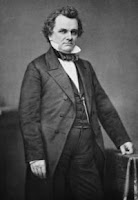"Douglas's fame did not intimidate Lincoln, however, and on July 24, 1858 Lincoln challenged Douglas to a series of debates to take place across the state of Illinois, asking him to 'divide time and address the same audiences.' " writes author James Gindlesperger on his Lincoln web site. "Both men knew slavery would be the top issue in the campaign, and both recognized that the debates would draw national attention. Douglas was disinterested at first but feared that he would be accused of cowardice if he refused. Finally he agreed but suggested that the debates take place in each Illinois Congressional District except the two (Chicago and Springfield) where both had already been. This left seven sites, and Lincoln agreed.
"Douglas and Lincoln could not have been more dissimilar. Douglas was short and stocky, Lincoln tall and lanky. Douglas dressed impeccably, Lincoln often appeared rumpled. Douglas's voice was rich and deep, Lincoln's high and thin. Douglas often traveled in a private railroad car, Lincoln traveled any way he could. On at least one occasion he was on a train that was switched onto a siding to sit and wait while Douglas's train passed.
"But perhaps there was no more contrast between the two than on the issue of slavery. Douglas blamed the issue of slavery on Northern abolitionists, saying they were simply agitating. He believed that popular sovereignty was an extension of local self-government, and he further believed that giving the federal government more power on the issue of slavery would restrict states rights, individual liberty, and ultimately, damage the Union.
"Lincoln took a position exactly opposite, believing that the expansion of slavery, if it came about, would be the result of popular sovereignty. A pragmatist, he believed also that the slavery issue would not be resolved until some crisis arose that would either extend slavery into the territories or end it completely. While he did not believe in equality of the races (and most did not in 1858) he did believe that it was immoral to own another person. He tried to assure Southerners that he had no intension of interfering with slavery where it already existed. Few believed him.
"The first debate was set for August 21, 1858, in the town of Ottawa, Illinois, a Republican stronghold. Despite the sweltering heat more than 12,000 spectators crowded into Washington Square to hear the two candidates. Many of them had come from Chicago, 80 miles to the northeast. Douglas charged that Lincoln had a plan to abolitionize the Whig and Democratic parties, and that he supported the most radical Republican policies. Accusing Lincoln of taking Mexico’s side in the Mexican War, he said the House Divided Speech. speech was particularly destructive. He played to the audience’s prejudices, saying that Illinois would become a free Negro colony if Lincoln won the election.
"For his part, Lincoln denied the charges, saying, 'There is a physical difference between the two [races], which in my judgment will probably forever forbid their living together upon the equal footing of equality...' He would repeat this theme throughout the debates. Lincoln is even reported as using the word 'nigger' twice, something he rarely did. However, he also stated that Negroes had rights under the Declaration of Independence.
"For three hours the debate went on, and when it was over the Republicans in the crowd were sure their man had won. A reporter from the New York Evening Post wrote, 'Listening to him [Lincoln], calmly and unprejudiced, I was convinced that he has no superior as a stump speaker.' "
The Democrats carried the day in the election that year, and so Douglas was returned to the Senate. In 1860, he faced Lincoln as one of the two Democratic nominees for president -- the party had split over slavery -- and lost.

No comments:
Post a Comment